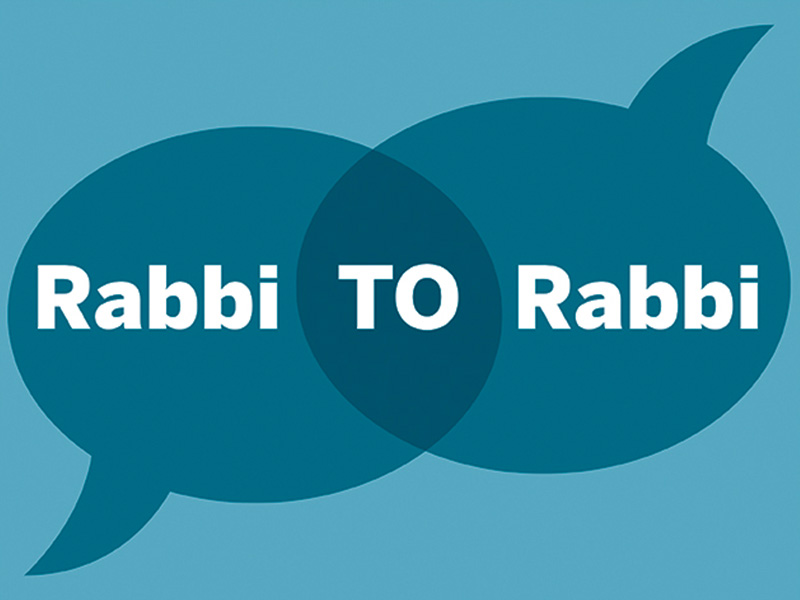Are they the ordinary people who find superhuman strength to celebrate life after tragedy, or those who try to seek justice and protect the nation’s soul?
Rabbi Yael Splansky
Holy Blossom Temple, Toronto
Rabbi Mark Fishman
Congregation Beth Tikvah, Montreal
Rabbi Splansky: Shalom from Israel. My Jerusalem hotel is just a short walk from the Liberty Bell Park, where the mitzvah is written on the replica bell: “Proclaim liberty throughout the land” (Leviticus 25:10). If Israel is to fulfill Isaiah’s call to be a “Light unto the nations,” (Isaiah 49:6) her people must “pursue justice” (Deuteronomy 16:20) and passionately so.
Beyond the noble soldiers of the IDF, who are the Israeli heroes you have come to know and admire?
Rabbi Fishman: If most of the time we teach from books and texts, the very Land of Israel itself and its people are those who have the most to teach us. We just have to be listening. This past November, I attended the wedding of Sara Littman and her groom, Ariel, in Israel. Sara’s father and brother had been tragically murdered just days before the wedding. So you ask who inspires me? The ordinary people of Israel, who, beset by tragedy, find the superhuman strength to celebrate life.
Rabbi Splansky: I’m here with a congregational social justice trip, and we visited Yad b’Yad, the extraordinary bilingual school in Jerusalem where Jewish and Arab children are taught by Jewish and Arab teachers.
We met two representative parents from the school – Elana, a modern Orthodox woman from Toronto, and Fadi, a Christian Arab man from Haifa. They remembered when the school was struck by Jewish arsonists, and when a neighbourhood bus was the target of Muslim terrorists. Fadi said, “When all hell breaks loose out there, this school is where we want to be.”
These parents are taking real cultural risks in order to prepare their children for respectful and successful coexistence.
Rabbi Fishman: There is no doubt in my mind that if peace in Israel will only come about by bringing ordinary people on both sides of the conflict face to face with one another. To meet the “other” and talk together, to find commonality and a shared humanity is the only way.
Yet I find it discouraging that so much interfaith dialogue and promotion of co-existence between Israelis and Palestinians is initiated by Israelis and their supporters in the Diaspora. Perhaps I am mistaken, but I feel that the pull toward co-existence is somewhat lopsided.
Everyone knows that both sides will benefit from peace. But have we reached the point where both sides wish to mutually recognize one another and indeed live side by side?
Rabbi Splansky: Southwest of Jerusalem, Beit Shemesh has become a flashpoint in the fight for women’s rights. Miriam, an Orthodox woman from New York, monitors the streets for illegal signs instructing women not to linger on the sidewalks in front of synagogues and to dress according to a strict modesty code. The word “women” was blackened out from the sign for the Women’s Health Clinic, as if it were a dirty word. I also count Miriam among Israel’s champions of justice.
The Canadian Jewish community is devoted to protecting the body of the State of Israel. Our people give generously to build hospitals, bomb shelters and army bases. But how can we also protect the soul of Israel? As our bus winds its way through the Judean hills and wadis, I hear the echo of the prophet Amos, saying, “Let justice flow like a mighty stream” (Amos 5:24).
Rabbi Fishman: While you hear Amos I hear Rabbi Abraham Isaac Kook, who once wrote: “We are great and our faults are great, and therefore our problems great, and great are our consolations.” Although our troubles may be immense, we are reminded that so too will our consolations be great as well. When everything finally reaches its completion, our joy and true celebration arrive.
I believe it is meritorious to offer donations from the Diaspora, yet I feel that it may be overreaching to suppose that we can “protect the soul of Israel.” I can’t put myself in an Israeli’s shoes. National conscription for teenagers, living with war and terror or the threat of annihilation – such a lifestyle impacts those in the country that we in the West may not fully appreciate.
There is certainly much still to be achieved in Israel, yet can we “outsiders” really tell them how to do it? Those privileged to live in the land are truly the shapers of Israel’s soul.
